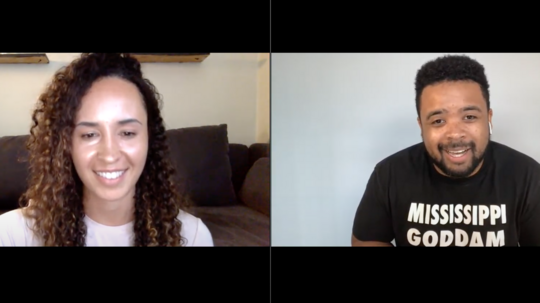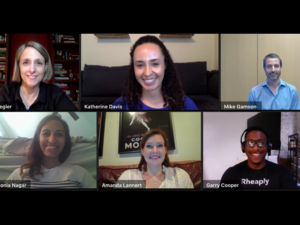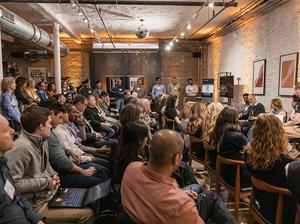
In Chicago Inno’s first Bytes with the Beat, a new virtual event series featuring one-on-one interviews with high-profile techies, Techstars Chicago’s Managing Director Neal Sáles-Griffin shared his insights on what it’s like to be Black in Chicago’s tech industry amid a renewed conversation around racial injustice in America.
Sáles-Griffin, who is a former startup founder, startup investor and mayoral candidate, grew up in Chicago and was introduced to the entrepreneurial world while attending Northwestern University. His first startup experience was helping to build Outcome Health, which at the time was named Context Media. From there, Sáles-Griffin pursued a career in the startup industry, later founding Code Academy and CodeNow, and investing in tech companies during his time at OCA Ventures.
In a 30-minute conversation with Inno’s Associate Editor Katherine Davis on Thursday afternoon, Sáles-Griffin shared the racism he’s experienced working in tech, explained why venture capital investors should prioritize diversity and dissected the pipeline problem excuse.
Like many other Black Chicago founders, Sáles-Griffin said he has struggled to fit in, be taken seriously and be shown the same respect as his White counterparts.
“In venture capital, and in tech, and in Chicago and in startups, there are a lot of people that are disconnected from issues of diverse founders,” Sáles-Griffin said.
In his role at Techstars Chicago, Sáles-Griffin said he has maintained an emphasis on fostering diversity and inclusion in the program. Soon after the death of George Floyd, Breonna Taylor and other unarmed Black people at the hands of police, and the protests that followed, Sáles-Griffin took the opportunity to address his team at Techstars, making a video explaining his own personal experiences as a Black person in tech.
“As a mixed-race, Black male growing up on the South Side of Chicago, I had the perspective that I thought would build some bridges and establish more empathy with a lot of my fellow teammates,” Sáles-Griffin said.
Besides helping to educate the Techstars team on issues of race and equality, Sáles-Griffin has also prioritized accepting diverse groups of founders into the program. The application deadline for Techstars’ next cohort is July 26 and Sáles-Griffin encourages Black, Brown and female founders to apply.
Nurturing and mentoring founders of color is one way Sáles-Griffin said he hopes to change the tech environment for Black and Brown founders in Chicago as it has, at times, been unfriendly to him. Sáles-Griffin explained that he has been the target of several ignorant, insensitive and downright racist comments.
"You're not like the rest of them."
“Why can’t more people be more like you?”
“Now there’s no more excuses.”
“Barack Obama is the president of the United States, so Black people can do anything.”
“You hear things like this said to you and you look around the room, and you realize that you’re the only one like you who can defend yourself,” Sáles-Griffin said. “Sometimes you don’t know whether if you speak up on something, you’re going to keep your job.”
Besides inappropriate comments and treatment, Black and Brown founders often struggle to raise venture capital funding at the same rate as their White counterparts. Inno reporting found that Chicago has very few Black-founded startups that have raised more than $1 million in funding over the course of their startups’ lifecycles.
To address the disparity, Sáles-Griffin said more investors need to commit to bringing on Black and Brown partners to their firms. Having a Black or Brown perspective on the team helps diversify a VC firm’s portfolio as those minority investors can identify with more founders of different backgrounds and experiences.
“Not only will you make more money, but you’ll have a better time, you’ll learn a lot more and you’ll do much better for the world,” Sáles-Griffin said. “Your kids, your grandkids and your great-grandkids deserve to enter into a world that does not judge them based on how they look or how they sound or where they’re from, but instead, on the merits of their actions and their substance.”
Sáles-Griffin said a good first step in addressing diversity issues in venture capital is for firms to publicly disclose the racial and gender makeup of their teams and portfolios. Progress happens when the community can have an open and transparent conversation about it.
And as for anyone who says they have a “pipeline problem” or cannot find suitable Black and Brown-founded startups to invest in, Sáles-Griffin challenged them to try harder.
“When people say it’s ‘hard,’ I would challenge them to think about how much effort they are putting in to solving that problem,” Sáles-Griffin said. “Because if this group of people are disproportionately unsupported and not invested in, then you’re going to have to disproportionately put in effort in order to find them. That comes with the job. That is your job to find these people and diversify your portfolio and to do the hard work that may be uncomfortable.”
The interview ended with a call to action for Chicago’s venture capital firms and tech companies. If everyone does their part to diversify their teams and networks, and acknowledge unconscious biases, Chicago’s tech ecosystem could be bigger, better and more equitable for all, Sáles-Griffin said.
“I see an opportunity to challenge our community to be leaders on this front,” Sáles-Griffin said. “If we want our founders to be creative and innovative, and if we want our investments to seem outstanding and outsized in their returns, then we’re going to have to be bold and deliberate in activating our full potential to solve these problems and address them head on.”
For information on upcoming Inno events, subscribe to Chicago Inno’s email newsletter, The Beat, a rundown of all the local tech events and news you need to know.







